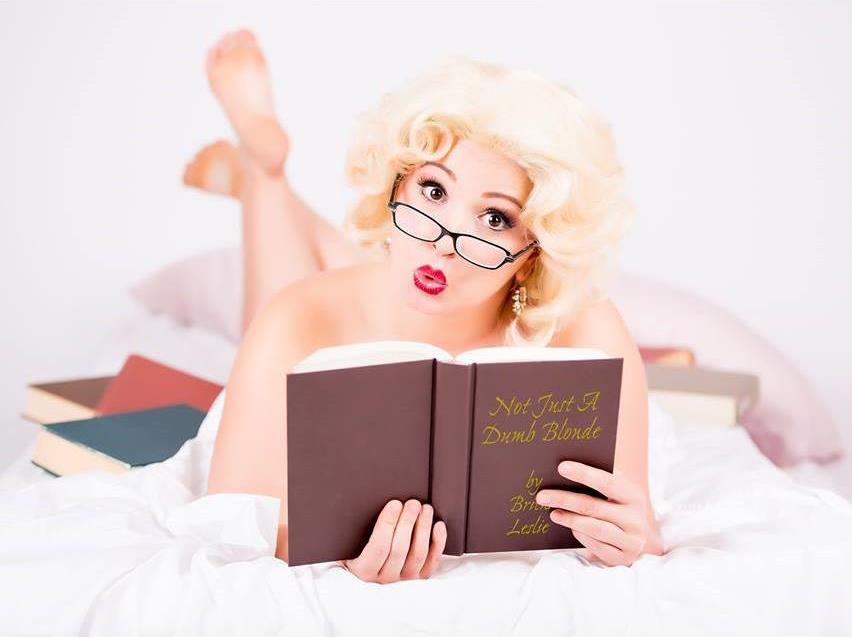Image: supplied
In housedress, tiara and Pollyanna glamour, Britni Leslie apprehends the stage with the familiar rhetorical, ‘It’s good to see me isn’t it?’before breaking into Glinda’s ‘Let Us Be Glad’ without so much as blinking.
Then, taking a breath, she looks around herself and into the audience – ‘I’m doing the wrong show, aren’t I?’
Trading tiara for thick-rimmed glasses, she begins again with ‘If I Knew You Were Comin’ I’d’ve Baked A Cake,’ but before we know it, she’s absolutely gorgeous, an avalanche of beauty in purple evening gown and bedazzling heels. Within three numbers and one snap costume change, we have been stepped through the genesis of the Dumb Blonde.
Delivered from her pigeonhole at the Butterfly Club, Leslie is all bubble and squeak and water whistle trill as she presents a comprehensive historiography of the Dumb Blonde, while maintaining tight control of her upper ranges throughout her voluminous musical catalogue, from Gentlemen Prefer to Chicago to SMASH, and everything in between.
Squeezed to bursting, we find our bottled blonde in high school corridors, rehearsal rooms and across audition panels, forced to compromise her self for the kind of Broadway career that came with the neatly prepackaged Blonde other people insist on.
Embracing the archetype even as she debunks it, Leslie carries out this auto-vivisection with bright eyes, extending an invitation to probe and interrogate her glossy illustration, with her stiff, synthetic platinum curls serving as centre piece of the exhibition.
Cannily integrating anecdote and intimate confession, pull-quote, citation and celebrity factoid, ditzy patter and dizzying repertory, in which the obscure and underrated are tactfully deployed among the bigger showstoppers, Leslie barely breaks a sweat in this finely calibrated cabaret.
About two thirds of the way through she jibes, ‘I just love learning history. Do you love it?,’ not-so-quietly celebrating the cleverness of her subterfuge. With the perm pulled firmly over our eyes, we’d barely have noticed the incredible wit behind her performance.
This kind of deft manoeuvre calls to mind the sly magician who reveals her tricks, before enchanting us again with the brilliance of her illusion. Having gone to great lengths to demonstrate her own complicity in her artificial misconstruction, she teases, ‘cabarets are supposed to be honest,’ winking at the incongruity of her affected persona and the cabaret form, with its presupposition of authenticity and further complicating its disjuncture with her ‘actual’ self.
Keeping pace with our high-octane tutor is Tim Verdon, who plays both essential collaborator and derisive co-host, offering voracious talent on the keys and gauche drollery, posing dumb-blonde jokes and veiled put-downs. With the announcement of her departure coming about five numbers too soon, Verdon backs her banter with the opening arpeggio to ‘Let Me Be Your Star’ becoming an incessant coda, as though playing her off an awards ceremony.
And so the Dumb Blonde seems to have overstayed her welcome, and yet she still keeps us wanting more. Hijacking ‘Roxie,’ she has her audience in the palm of her hand, with the whole crowd whispering ‘Britni, Britni, Britni…’
Having started our journey in the eighteenth century with Rosalie Duthe, the French courtesan known for her long, vacant pauses, and for being the type’s first target, we’ve been rattled on through to our own twenty-first: Britney Spears, Kristen Chenoweth, Megan Hilty and Taylor Swift.
With her final number, we toast to the Dumb Blonde’s endless resurrection and Leslie saves her best note for last as she cries, ‘they just keep moving the line!’ The lights snap out, the performance is over; and we are finally given a moment to dig beneath the surface of what now can only ever be a brilliant and fleeting memory.
Rating: 4 out of 5 stars
Not Just A Dumb Blonde
Written and performed by Britni Leslie
Accompanied by Tim Vernon
The Butterfly Club





